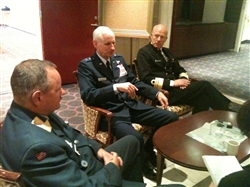Blog Posts tagged with "Netherlands"
Arctic Nations Meet to Discuss Communication, Maritime Domain Awareness Strategy
As the Arctic climate continues to change, Arctic area nations are working together to address security concerns. Recently I was honored to represent U.S. European Command at the Arctic Security Forces Roundtable (ASFR) in Bodo, Norway. The Roundtable was attend by 12 nations focused on improving communications and maritime domain awareness.
The twelve countries include: Canada, Denmark, Finland, France, Germany, Iceland, Netherlands, Norway, Russia, Sweden, United Kingdom and the U.S.
As the ice cover in the Arctic lessens, opportunities arise to promote a balanced approach to improving human safety and environmental security in the region through multilateral, collaborative relationships. In cooperation with our Arctic partners, USEUCOM will help develop new ideas for shared maritime domain awareness and communications.
What exactly is USEUCOM's role in the Arctic, you might wonder? Well, as a military organization, we stand ready to provide forces in support of safe, sustainable, cooperative use of the Arctic. For example, exercise NORTHERN EAGLE 2012 -- which just wrapped up a few days ago -- involved in-port and at-sea training. The exercise included communications, maritime interdiction operations, force protection, search and rescue, navigation and aviation operations, as well as ashore maritime command and control.
This is not a small commitment for any Arctic nation. The Arctic, an area of about 13 million square miles, is one of the last undiscovered regions left in the world. Though the ice melting in the Arctic sea lanes presents opportunity that can reduce travel times with new, shorter shipping routes, this change also poses unique challenges which Arctic nations must face. An increase in ship traffic means the potential for more search and rescue, pollution response and law enforcement.
As maritime traffic increases in the Arctic region, lack of adequate communication may pose a risk to the safety of maritime operations. Only 25 percent of the Arctic waters are actually mapped to modern hydrographic standards and there is no question that a shorter, more accessible shipping route will attract cargo, cruise and military vessels. These ships will have to cope with inadequate information about traversing dangerous waters. The opening of the Arctic presents opportunities to work collaboratively in multilateral forums to promote a balanced approach to improving human safety and environmental security in the region.
At the ASFR, one of the key discussion points has been how to establish better coordination of current standard operating procedures across all Arctic security stakeholders. For example, further analysis of regional search and rescue could assist in base-lining basic communication needs across the region for safe maritime operations.
The Arctic is an area where Russia, the U.S. and other European nations can work together. The United States and USEUCOM view the Arctic as one of the main areas where we can foster closer cooperation with Russia, especially in search and rescue operations. Search and rescue is one of the most likely scenarios where shared national resources could support other sovereign nations leading a multinational effort.
I think in the past, coverage of the Arctic climate change has focused too much on the negative. In reality, nations are willing to collaborate and cooperate. The Arctic Council, Northern Chiefs of Defense meetings and ASFR are very visible examples of this cooperative spirit.
We at USEUCOM stand ready with our Arctic partners to support a safe, stable and secure Arctic region. While Arctic nations still have a long way to go in addressing communication and maritime domain awareness issues, the ASFR is a collective step in the right direction.
Maj. Gen. Mark O. Schissler
Director, Strategy and Policy
Find more blog posts tagged with:
- Finland
- collaboration
- communications
- partnership
- Netherlands
- Germany
- Iceland
- Interagency
- security
- United Kingdom
- Sweden
- Canada
- France
- Russia
- Norway
- environment
- multinational
- Denmark
- Arctic
Phoenix Endeavor - a military spectrum management exercise
You’ve seen quite a few posts here about USEUCOM’s Combined Endeavor (CE) exercise that is currently being conducted in Bosnia and Herzegovina, Denmark, and the Netherlands. But what you may not have heard about is Phoenix Endeavor -- also known as PE -- which we believe is the world’s premier international military spectrum management exercise!
Find more blog posts tagged with:
Bosnia and Herzegovina Prepares for Combined Endeavor 2009
During my recent visit to Bosnia and Herzegovina, I saw first hand the great job our BiH partners are doing in Banja Luka as they prepare to host the US European Command’s communications interoperability exercise, Combined Endeavor 2009. The exercise, which will be held from Sep 4-17, is in its 15th year.

Comments: 0